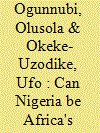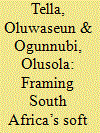| Srl | Item |
| 1 |
ID:
144697


|
|
|
|
|
| Summary/Abstract |
Does the reference to regional hegemony in the African context apply to Nigeria? This study examines this question in line with increasing claims in academic and diplomatic circles of Nigerian hegemony in Africa. While scholars and leading opinion holders have described Nigeria's influence in Africa as typical of a regional hegemon, this paper interrogates the substance of this argument in the context of the nature of the country's foreign policy relations in Africa. Against this background, the article contends that Nigeria actually enjoys a dwindling influence in Africa notwithstanding its current status as Africa's largest economy. The article argues that although Nigeria has never officially harboured any hegemonic aspirations, this hardly disqualifies it from being Africa's hegemonic power. It takes the position that Nigeria remains an important regional power on the continent but is hindered by several factors in playing a hegemonic role. In making this assertion, the article considers a number of conditions that increasingly deflate Nigeria's capacity to play a meaningful hegemonic role in Africa. In doing this, it critically assesses the inherent internal and constraining external conditions that diminish Nigeria's claims to or credentials for effective regional hegemony.
|
|
|
|
|
|
|
|
|
|
|
|
|
|
|
|
| 2 |
ID:
155795


|
|
|
|
|
| Summary/Abstract |
This paper examines the utility of the hegemonic stability theory in understanding regional power dynamics within Africa. The study operationalizes the concept of regional hegemony by drawing insights from a comparative foreign policy analysis of African regional powers, with emphasis on Nigeria. Using a largely qualitative methodology supplemented with primary data, the paper examines the underlying assertions of Nigeria’s perceived ‘hegemonic’ influence. Through the use of the hegemonic stability theory as a theoretical lens, this paper argues that Nigeria’s foreign policy shows few signs of a continental hegemonic disposition. In applying this theory at a regional level of analysis, the study finds very little empirical evidence that it fits the African regional context. In short, hegemonic claims in Africa are mere (un)official rhetoric and lack substance.
|
|
|
|
|
|
|
|
|
|
|
|
|
|
|
|
| 3 |
ID:
154776


|
|
|
|
|
| Summary/Abstract |
South Africa arguably stands well above its regional counterparts in terms of soft power resources. This is not entirely unconnected with the uncalculated attempts by non-state actors to extend the reach of the country’s soft power status across the world. This article probes the contributions of the informal drivers of South Africa’s soft power. These ‘soft powered’ institutions and individuals (with no definite state affiliation) are critical contributors to South Africa’s soft power diplomacy. The country’s soft power is in part driven by the unintended outcome of the actions of a wide variety of non-state actors including civil society, the media, iconic individual personalities and multinational corporate entities. The article argues that South Africa can realise its greater foreign policy ambition and cement a benevolent hegemonic profile in Africa by focusing on specific roles that its informal soft power sources can play. Therefore, as an emerging power, South Africa is well placed to harness the substance inherent in its soft power instruments and resources by paying attention to these unofficial soft power sources but also strategically fine-tuning the same with official policy goals in subtly achieving Pretoria’s ambitions as a key player in international political discourse.
|
|
|
|
|
|
|
|
|
|
|
|
|
|
|
|
| 4 |
ID:
182436


|
|
|
|
|
| Summary/Abstract |
After decades of diplomatic disengagement from Africa, Russia is making a strong bid to facilitate bilateral relations with more African states. Many analysts regard this as an attempt to project power and influence outside of Russia's immediate borders in Eastern Europe and to whittle down the West's influence in Africa. The deepening ties between Russia and African states have led to the incursion of Russian political operatives and disinformation experts who have meddled in the political and electoral processes of countries such as Zimbabwe, Mozambique and the Democratic Republic of the Congo. However, while Russian election interference in advanced western democracies has attracted extensive scholarly interest, similar meddling by Russian agents on the African continent has been subject to little scrutiny. This article sheds light on the methods used by Russian political operatives to meddle in elections in Africa. It concludes that Russia's renewed interest in Africa could have grave consequences for democracy on the continent if left unchecked.
|
|
|
|
|
|
|
|
|
|
|
|
|
|
|
|